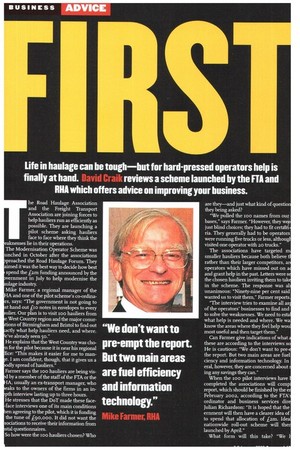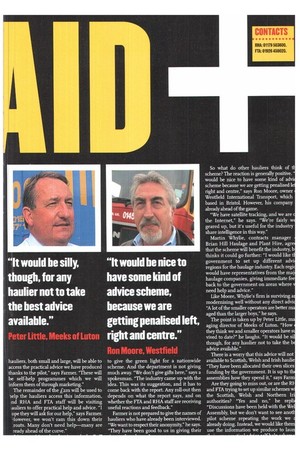Life in haulage can be tough but for hard-pressed operators
Page 30

Page 31

If you've noticed an error in this article please click here to report it so we can fix it.
help is finally at hand. dvIUtiraik reviews a scheme launched by the FTA and RHA which offers advice on improving your business.
he Road Haulage Association and the Freight Transport Association are joining forces to help hauliers run as efficiently as possible. They are launching a pilot scheme asking hauliers face to face where they think the eaknesses lie in their operations.
The Modernisation Operator Scheme was unched in October after the associations proached the Road Haulage Forum. They aimed it was the best way to decide how best spend the fzm funding announced by the vernment in July to help modernise the ulage industry Mike Farmer, a regional manager of the A and one of the pilot scheme's co-ordinars, says: "The government is not going to t hand out fro notes in envelopes to every ulier. Our plan is to visit too hauliers from e West Country region and the major conurbuns of Birmingham and Bristol to find out actly what help hauliers need, and where. eve already seen 5o."
He explains that the West Country was chon for the pilot because it is near his regional ce: "This makes it easier for me to mane. I am confident, though, that it gives us a dly spread of hauliers."
Farmer says the too hauliers are being vis by a member of the staff of the FTA or the A, usually an ex-transport manager, who eaks to the owners of the firms in an inpth interview lasting up to three hours.
He stresses that the DoT made these face-face interviews one of its main conditions en agreeing to the pilot, which it is funding the tune of fqo,000. It did not want the sociations to receive their information from stal questionnaires.
So how were the too hauliers chosen? Who are they—and just what kind of questio they being asked?
"We pulled the too names from our bases," says Farmer. "However, they wer just blind choices: they had to fit certain. ria. They generally had to be operators were running five trucks or less, althougl visited one operator with zo trucks."
The associations have targeted m smaller hauliers because both believe t rather than their larger competitors, ar operators which have missed out on a and grant help in the past. Letters were s the chosen hauliers inviting them to tak in the scheme. The response was al unanimous: "Ninety-nine per cent said wanted us to visit them," Fanner reports "The interview tries to examine all as of the operators' businesses to find and to solve the weaknesses. We need to esta what help is needed and where. We wa know the areas where they feel help wou most useful and then target them."
Can Farmer give indications of what • these are according to the interviews s He is cautious: "We don't want to pre. thereport. But two main areas are fue ciency and information technology. In eral, however, they are concerned about ing any savings they can."
When the too pilot interviews have completed the associations will corn report, which should be finished by the e February 2002, according to the FTA' ordinator and business services dir Julian Richardson: "It is hoped that the emment will then have a clearer idea of to spend that allocation of Lam. Ide nationwide roll-out scheme will the launched by April."
What form will this take? "We hauliers, both small and large, will be able to access the practical advice we have produced thanks to the pilot," says Farmer. "These will be self-help programmes which we will inform them of through marketing."
The remainder of the Lam will be used to telp the hauliers access this information, :TA RHA and FTA staff will be visiting iauliers to offer practical help and advice. "I ope they will ask for our help," says Farmer :-lowever, we won't ram this down their .roats. Many don't need help—many are ready ahead of the curve."
to give the green light for a nationwide scheme. And the department is not giving much away. "We don't give gifts here," says a spokesman. "The industry came up with the idea. This was its suggestion, and it has to come back with the report. Any roll-out then depends on what the report says, and on whether the FTA and RHA staff are receiving useful reactions and feedback."
Farmer is not prepared to give the names of hauliers who have already been interviewed. "We want to respect their anonymity," he says. "They have been good to us in giving their So what do other hauliers think of scheme? The reaction is generally positive. would be nice to have some kind of advi scheme because we are getting penalised 1 right and centre," says Ron Moore, owner Westfield International Transport, which based in Bristol. However, his company already ahead of the game.
"We have satellite tracking, and we are the Internet," he says. "We're fairly w geared up, but it's useful for the industry share intelligence in this way."
Martin Whylie, contracts manager Brian Hill Haulage and Plant Hire, agre that the scheme will benefit the industry, b thinks it could go further: "I would like government to set up different advi regions for the haulage industry. Each regi would have representatives from the maj haulage companies, giving immediate f back to the government on areas where need help and advice."
Like Moore, Whylie's firm is surviving a modernising well without any direct advi "A lot of the smaller operators are better aged than the larger boys," he says.
The point is taken up by Peter Little, m aging director of Meeks of Luton. "How they think we and smaller operators have vived to date?" he laughs. "It would be s' though, for any haulier not to take the b advice available."
There is a worry that this advice will not available to Scottish, Welsh and Irish haulie "They have been allocated their own slices funding by the government. It is up to th assemblies how they spend it," says Farm Are they going to miss out, or are the R and FTA trying to set up similar schemes the Scottish, Welsh and Northern I authorities? "Yes and no," he repli "Discussions have been held with the We Assembly, but we don't want to see ano pilot scheme repeating the work we already doing. Instead, we would like the use the information we produce to lau




























































































































